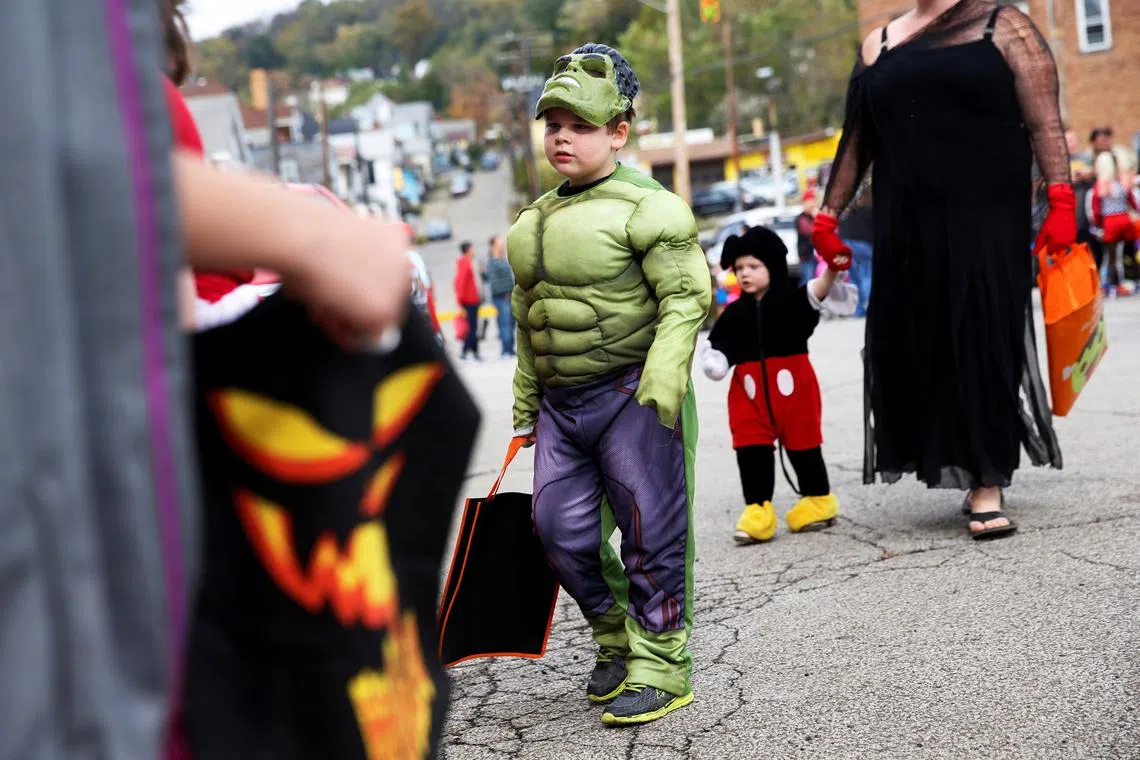Troubled US retailers scared by forecast of consumers spending less this Halloween
Sign up now: Get ST's newsletters delivered to your inbox

Sales of costumes and greeting cards in the US are likely to see the greatest decline over the Halloween holiday season in 2024.
PHOTO: REUTERS
Follow topic:
NEW YORK – A predicted slide in Halloween consumption is the latest blow for heavily indebted retailers battling mounting overheads and the trend of consumers trading down to cheaper products.
US spending for the holiday will drop by 5 per cent to US$11.6 billion (S$15.1 billion) in 2024, according to the country’s National Retail Federation. Sales of greeting cards and costumes are likely to see the greatest decline, a hit to merchants reliant on seasonal splurges in what has already been a tough year for the industry.
Households on the lower end of the income scale are broadly struggling as unemployment has edged higher in 2024 and underlying inflation has remained persistently high. Retailer Michaels said on a recent earnings call that households earning less than US$100,000 are reducing their spending, resulting in lower basket sizes.
Ms Erica Weisgerber, a partner at law firm Debevoise & Plimpton, said: “2024 has been a perfect storm for retailers of all stripes. Inflation, high operational costs, and reduced consumer spending have been especially challenging for brick-and-mortar retailers, and online retailers have struggled with steep competition from e-commerce giants like Amazon.”
Many of the troubled firms, including Michaels and At Home Group, are owned by private equity managers after buyouts during the pandemic proved ill-timed when interest rates rose and inflation crimped household budgets.
Home, clothing and hobby retailers dominate the list of distressed retailers because the size of their debt means they lack the liquidity to compete with better capitalised competitors, according to Moody’s Ratings.
Still, Michaels and At Home are hopeful that they can win a larger slice of the holiday spending. At Home saw a strong start to Halloween spending after flat second-quarter net sales of about US$443 million, chief financial officer Jerry Murray said on a September earnings call.
Michaels also saw a revenue pop tied to Halloween as customers began to buy inventory earlier in 2024, according to people on September’s earnings call. That is a fillip for the company whose earnings declined by about 20 per cent to US$50 million for the second quarter from a year earlier, the people said, asking not to be identified as the information is private.
The pullback is creating challenges for the wider industry and has contributed to several high-profile bankruptcies in 2024, including Joann, Big Lots and Conn’s. It also makes it harder to turn companies around simply by slashing costs.
With capital markets shunning troubled firms, more retailers turned to bankruptcy rather than distressed exchanges over the past year as the companies require deeper restructuring that is best done in court, Moody’s Ratings said in a report in September. It is part of a wider trend that saw quarterly filings for Chapter 11 bankruptcy protection rise to the highest level since 2012 in the three months until June.
Private equity’s widespread failure to hedge against rising borrowing costs also means it is less able to come to the rescue of troubled firms, which could have knock-on effects for the economy and jobs. BLOOMBERG

